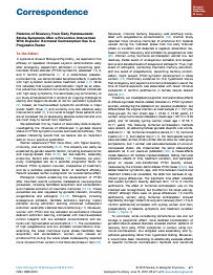Patterns of Recovery From Early Posttraumatic Stress Symptoms After a Preventive Intervention With Oxytocin : Hormonal Contraception Use Is a Prognostic Factor
In a previous issue of Biological Psychiatry, we reported on the efficacy of repeated intranasal oxytocin administration early after emergency department admission in preventing posttraumatic stress disorder (PTSD) symptoms, assessed 1.5, 3, and 6 months posttrauma (1). In a randomized, placebocontrolled trial, we demonstrated beneficial effects in patients with high symptom levels before treatment onset (1,2). While this indicates that oxytocin administration might be an effective preventive intervention for recently traumatized individuals with high early symptoms, the accompanying commentary to our study emphasized that it remains an ongoing challenge to identify and target individuals at risk for persistent symptoms (3). Indeed, as trauma-related symptoms constitute a major public health issue (4) and currently only few effective early interventions exist (5), it is crucial to target those patients who are at increased risk of developing adverse outcomes and who are most likely to benefit from treatment.
Geachte bezoeker,
De informatie die u nu opvraagt, kan door psychotraumanet niet aan u worden getoond. Dit kan verschillende redenen hebben,
waarvan (bescherming van het) auteursrecht de meeste voorkomende is. Wanneer het mogelijk is om u door te verwijzen naar de bron
van deze informatie, dan ziet u hier onder een link naar die plek.
Als er geen link staat, kunt u contact opnemen met de bibliotheek,
die u verder op weg kan helpen.
Met vriendelijke groet,
Het psychotraumanet-team.
In: Biological Psychiatry ISSN 0006-3223 | 85 | 12 | e71-e73
https://doi.org/10.1016/j.biopsych.2019.01.014


